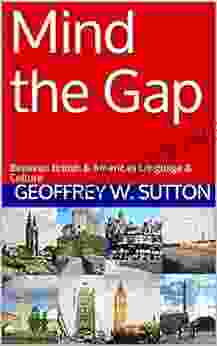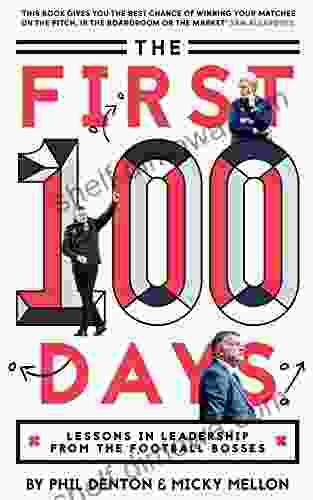Mind the Gap: Unraveling the Linguistic and Cultural Divide Between British and American English

In the realm of global communication, the English language reigns supreme as the lingua franca of international discourse. However, beneath the surface of this seemingly unified linguistic landscape lies a fascinating tapestry of regional variations that reflect the diverse cultural heritage and historical experiences of different English-speaking nations. Among these variations, the differences between British and American English stand out as a particularly intriguing example.
4 out of 5
| Language | : | English |
| File size | : | 2134 KB |
| Text-to-Speech | : | Enabled |
| Screen Reader | : | Supported |
| Enhanced typesetting | : | Enabled |
| Word Wise | : | Enabled |
| Print length | : | 221 pages |
| Lending | : | Enabled |
While both variants share a common ancestry, they have evolved along distinct paths, shaped by the unique socioeconomic, political, and cultural forces that have shaped the societies they serve. As a result, British and American English have developed their own distinctive vocabulary, pronunciation, grammar, and idiomatic expressions, creating a linguistic gap that can sometimes lead to misunderstandings and communication challenges.
Lexical Differences: A Vocabulary Divide
One of the most noticeable differences between British and American English lies in their vocabulary. While many words are shared between the two variants, there are also a significant number of words that have different meanings or are used exclusively in one region or the other. For example, the British term "biscuit" refers to a small, sweet cookie, while Americans use the same word to describe a savory, unleavened bread. Similarly, the British "boot" is an item of footwear, while Americans call it a "shoe."
These lexical differences can extend beyond individual words to encompass entire phrases and idioms. For instance, the British expression "to have a cuppa" means to have a cup of tea, while Americans would simply say "to have a cup of coffee." The British "to be knackered" translates to "to be exhausted" in American English, and the American "to get the jitters" means "to become nervous or anxious" in British English.
Pronunciation: The Sound of Difference
Beyond vocabulary, pronunciation is another area where British and American English diverge. One of the most striking differences is the pronunciation of the letter "r." In British English, the "r" is typically pronounced in all positions, including at the end of words. Americans, on the other hand, often drop the "r" at the end of words, a phenomenon known as "r-dropping."
Another notable difference in pronunciation is the way vowels are pronounced. For example, the vowel sound in the word "bath" is pronounced differently in British and American English, with the British pronunciation being closer to "bar" and the American pronunciation closer to "bay."
Grammar: Rules and Exceptions
While British and American English share a common grammatical framework, there are some subtle differences in their usage. For instance, British English tends to use the past perfect tense more frequently than American English. The past perfect is used to describe an action that happened before another past action, and it is often used in conjunction with the simple past tense. For example, a British speaker might say "I had already finished my homework before my parents came home," while an American speaker would be more likely to say "I finished my homework before my parents came home."
Another grammatical difference lies in the use of prepositions. For example, British English uses the preposition "on" in some situations where Americans would use "in." For instance, a British person might say "I'm on the phone," while an American would say "I'm in the phone."
Cultural Context: Beyond Words
The differences between British and American English extend beyond the realm of grammar and pronunciation into the broader realm of culture. These differences reflect the unique histories, social norms, and cultural values of the two countries. For example, the British use of the term "mate" as a term of endearment or camaraderie has no direct equivalent in American English, where the more common term is "buddy." Similarly, the American expression "to go Dutch" (to split the bill) has no direct British equivalent, reflecting the different cultural attitudes towards sharing expenses.
These cultural differences can sometimes lead to misunderstandings or misinterpretations, particularly in situations where people from different language backgrounds are interacting. For example, an American who uses the term "awesome" to express enthusiasm may be surprised to find that this term is considered somewhat informal or slangy in British English. Similarly, a British person who uses the term "banter" to refer to friendly teasing may find that this term is not as well understood by American audiences.
Bridging the Gap: Effective Communication
Despite the differences between British and American English, effective communication between speakers of these two variants is entirely possible. The key lies in being aware of the potential for misunderstandings and taking steps to clarify meaning when necessary. For example, when speaking with someone from a different language background, it is helpful to use clear and concise language, avoid slang or colloquialisms, and be prepared to explain any unfamiliar terms or phrases.
In addition, it is important to be respectful of the cultural differences that may underlie linguistic variations. For example, if an American speaker is unsure about the appropriate way to address someone from a British background, it is always best to err on the side of formality until the other person's preferences are known. By being mindful of cultural nuances and adapting communication styles accordingly, it is possible to bridge the linguistic gap and foster effective communication across cultural boundaries.
: Embracing the Diversity of Language
The differences between British and American English are a testament to the rich tapestry of cultural diversity that exists within the English language. These differences, while sometimes challenging, also present an opportunity for learning, understanding, and cross-cultural exchange. By embracing the linguistic and cultural diversity of the English language, we can enhance our communication skills, deepen our understanding of different cultures, and build bridges of connection that span the globe.
4 out of 5
| Language | : | English |
| File size | : | 2134 KB |
| Text-to-Speech | : | Enabled |
| Screen Reader | : | Supported |
| Enhanced typesetting | : | Enabled |
| Word Wise | : | Enabled |
| Print length | : | 221 pages |
| Lending | : | Enabled |
Do you want to contribute by writing guest posts on this blog?
Please contact us and send us a resume of previous articles that you have written.
 Book
Book Novel
Novel Page
Page Chapter
Chapter Text
Text Story
Story Genre
Genre Reader
Reader Library
Library Paperback
Paperback E-book
E-book Magazine
Magazine Newspaper
Newspaper Paragraph
Paragraph Sentence
Sentence Bookmark
Bookmark Shelf
Shelf Glossary
Glossary Bibliography
Bibliography Foreword
Foreword Preface
Preface Synopsis
Synopsis Annotation
Annotation Footnote
Footnote Manuscript
Manuscript Scroll
Scroll Codex
Codex Tome
Tome Bestseller
Bestseller Classics
Classics Library card
Library card Narrative
Narrative Biography
Biography Autobiography
Autobiography Memoir
Memoir Reference
Reference Encyclopedia
Encyclopedia George Selden
George Selden Scott Fishman
Scott Fishman Gene Lipen
Gene Lipen Mai Der Vang
Mai Der Vang Martin Goodman
Martin Goodman Gascoigne Js
Gascoigne Js Patrick Hofstadt
Patrick Hofstadt Gopal B Saha
Gopal B Saha Mark Hunter
Mark Hunter Gilbert Murray
Gilbert Murray Laura Diana Miller
Laura Diana Miller Shaun Mckenna
Shaun Mckenna Rose Publishing
Rose Publishing Gerald L Guy
Gerald L Guy Gilded Penguin
Gilded Penguin Giant Rabbit
Giant Rabbit Gerry Legister
Gerry Legister Georgios Kourogiorgas
Georgios Kourogiorgas Gina Devere
Gina Devere Jorge Escamilla H
Jorge Escamilla H
Light bulbAdvertise smarter! Our strategic ad space ensures maximum exposure. Reserve your spot today!

 Ryūnosuke AkutagawaLiterary Trails of Eastern North Carolina: Unveiling the Tar Heel State's...
Ryūnosuke AkutagawaLiterary Trails of Eastern North Carolina: Unveiling the Tar Heel State's...
 Salman RushdieMaximize Your Financial Future with Price Forecasting Models for Farmers...
Salman RushdieMaximize Your Financial Future with Price Forecasting Models for Farmers...
 Demetrius CarterUnlocking Value: Identifying Lean Six Sigma Projects That Deliver Measurable...
Demetrius CarterUnlocking Value: Identifying Lean Six Sigma Projects That Deliver Measurable... Diego BlairFollow ·19.4k
Diego BlairFollow ·19.4k Sam CarterFollow ·14.6k
Sam CarterFollow ·14.6k Dean ButlerFollow ·15.6k
Dean ButlerFollow ·15.6k Seth HayesFollow ·17.7k
Seth HayesFollow ·17.7k Jerome BlairFollow ·10.4k
Jerome BlairFollow ·10.4k Yasushi InoueFollow ·10.3k
Yasushi InoueFollow ·10.3k Bret MitchellFollow ·16.5k
Bret MitchellFollow ·16.5k Ibrahim BlairFollow ·10.4k
Ibrahim BlairFollow ·10.4k

 Israel Bell
Israel BellUncover the Secrets of Cinematic Storytelling with "Knew...
Embark on a Transformative Journey into...

 Edward Bell
Edward BellCowboy Guide To Packing The Backyard Horse
The Ultimate Guide to Packing Your Horse for...

 Ruben Cox
Ruben CoxThe Works of Archimedes: A Monumental Legacy of...
In the annals of...

 Deacon Bell
Deacon BellThe Reaper: Killer Miller - A Spine-Tingling Western...
A Journey into the...

 Hugh Bell
Hugh BellOcean Warming and Father's Legacy: A Compelling Read for...
Dive into a Poignant Tale...
4 out of 5
| Language | : | English |
| File size | : | 2134 KB |
| Text-to-Speech | : | Enabled |
| Screen Reader | : | Supported |
| Enhanced typesetting | : | Enabled |
| Word Wise | : | Enabled |
| Print length | : | 221 pages |
| Lending | : | Enabled |








